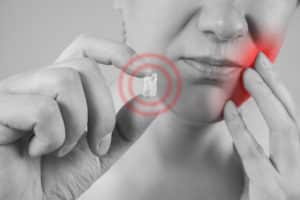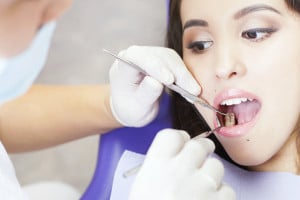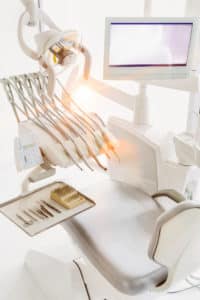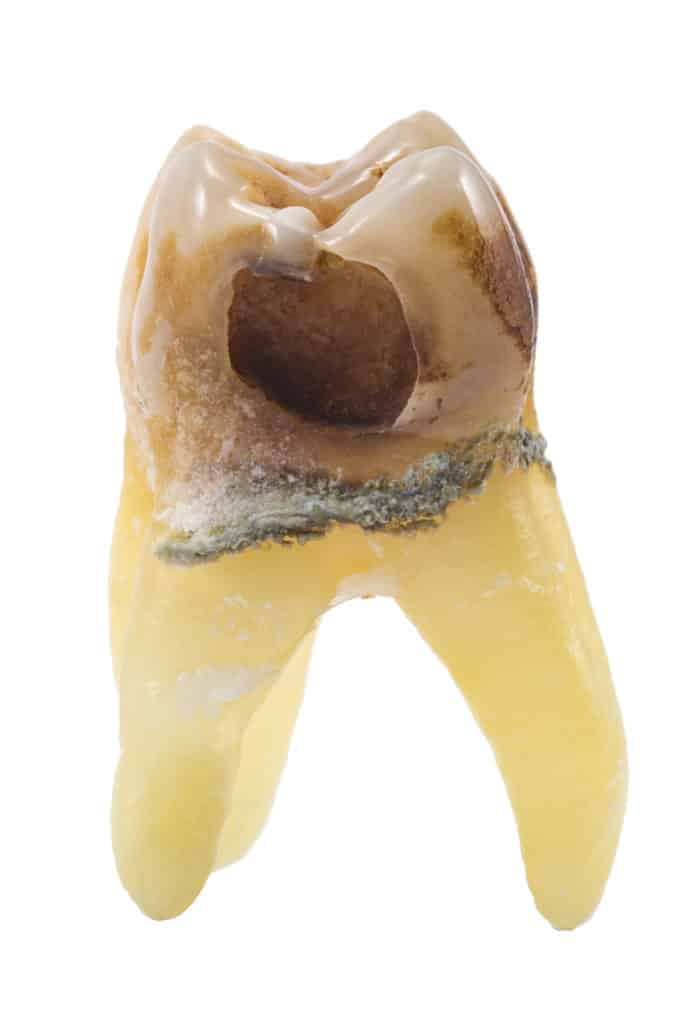Leave Wisdom Teeth to The Caveman
Wisdom teeth — now there’s a good one. Considering the cost of dental problems this third set of molars can cause, “wise” shouldn’t be associated with them in any way. At Gentle Dental we offer wisdom tooth extraction to patients from Edison, Metuchen, & South Plainfield, NJ.
What Are Wisdom Teeth?
Anthropologists actually classify human wisdom teeth as “vestigial organs” — body parts that have become functionless due to evolution. That means they haven’t served as much more than an annoyance since back when we were getting chased around by saber-toothed tigers. Back then, there were two reasons to have a third set of molars. First, our diet consisted of leaves, nuts, roots, and some very tough meat that required greater chewing power and caused greater tooth wear. To accommodate these extra teeth our jaws were longer than they are now.

But as our diets have changed to fewer roots and more Greek yogurt, evolution has made our wisdom teeth superfluous. The problem is no one told them, and they still try and make their way into our mouths. The sequence of our molars coming in is this: the first set erupts around age six, the second set around age 12, and the third set erupts between the ages of 17 and 25. In theory, we are “wiser” at that point, hence the name wisdom teeth.
What Has Impacted Wisdom Teeth?
As discussed above, our wisdom teeth are relics of our prehistoric past. There is no longer adequate room in our modern mouth to handle this third set of molars. So, when they descend, for most people they cause all sorts of problems.
The main problem is that they become impacted. This means that the tooth becomes stuck below the surface of the patient’s gums. These typically grow sideways or at an angle toward the second molar next to it. They may partially emerge through the gums, making some of the tooth crown visible. These are partially impacted wisdom teeth.
Why Wisdom Teeth Should Be Removed
Like our tailbones or appendix, wisdom teeth are no longer required equipment but come in they still do. Unfortunately, evolution has shortened our jaws quite a bit and now there isn’t any room. So, when your wisdom teeth try and enter your mouth they usually become impacted, or blocked, by the other teeth. They sometimes come in sideways. Often they come in surrounded by jawbone. Sometimes they partially erupt, creating pockets in the gums where bacteria love to accumulate.

With very, very few exceptions wisdom teeth do not work well with our modern dental alignment so they need to be manually extracted. If left in place, they will invariably cause the other teeth to be pushed out of position and cause other problems.
When Is The Best Time To Extract Wisdom Teeth?
The best time to have the wisdom teeth extracted is when the patient is between the ages of 15 and 18. This is because, at this point, the wisdom tooth roots are only two-thirds formed (remember, they can erupt anywhere up to around age 25). The longer you wait, the more likely their removal will be much more difficult.
Patient Testimonial:
I’ve had some work done on my teeth over the years and have always considered Dr. Strober, Margaret, and the rest of the staff to be courteous, professional, and thorough with their work. If I had any issues with some of the procedures, they would ask me to come back so they could find solutions or adjustments to the procedures. I’d recommend Gentle Dental to anyone interested in going to a dentist with great service and professionalism. -Kevin P.
The Benefits Of Having Wisdom Teeth Removed
Our wisdom teeth no longer serve a purpose, hence the reason they are categorized as vestigial organs (even though they aren’t technically an “organ”). They served their purpose when our diets consisted of roots, bark, and other tasty items, but we’ve evolved into having shorter jaws because we don’t need that third set of molars with our modern soft diets.
That’s why the wisdom teeth almost always need to come out, as they’re usually going to cause problems if allowed to stay.
The benefits of these surgeries are to prevent any of these issues from happening in your mouth:
- Damage to other teeth — When a wisdom tooth pushes against a second molar, it may damage the second molar or increase the risks of infection in the area. It can also cause crowding and movement of that second molar.
- Cysts — The wisdom teeth develop in a sac within the jawbone. The sac can fill with fluid, forming a cyst that can damage the jawbone, teeth, and nerves. Occasionally a benign tumor develops.
- Decay — Partially impacted wisdom teeth appear to be at higher risk of tooth decay than other teeth. This is likely due to the problem of bacteria being trapped between the gums and the partially erupted tooth.
- Gum disease — The difficulty of cleaning partially impacted wisdom teeth increases your risk of developing gum disease in that area of your mouth.
- Alignment — Impacted wisdom teeth, especially those rolled onto their side, put pressure on the adjacent teeth. Over time, this can make those teeth move, which messes up the person’s bite alignment. This leads to myriad problems down the road, everything from temporomandibular joint disorder to excessive tooth grinding to cracked teeth.

How Are Wisdom Teeth Removed?
X-rays will show the descending teeth, which is another reason to keep your teenager on a schedule of regular twice-yearly professional exams and cleanings. The extraction of the wisdom teeth can be simple if the teeth have fully erupted, but this is rare. In most cases, they are impacted in some way. They often need to be broken and taken out in sections to minimize the impact on surrounding gum tissue and the jawbone. This is considered minor surgery.
Will I Be Sedated Or Under General Anesthesia For A Wisdom Tooth Extraction?
Your method of anesthesia can vary depending upon the condition of your wisdom teeth. If the extraction is pretty straightforward and the wisdom teeth on x-rays look accessible, we may opt for only local anesthesia and sedation.
But sometimes these teeth are quite difficult to remove. They can have odd attachments to the jawbone. They can be placing a good deal of pressure against the adjacent tooth. Plus, the gums will have to be opened to access impacted teeth. In these more extreme cases, general anesthesia could be a better option.
Does Getting Your Wisdom Teeth Hurt?
Thanks to modern anesthesia, you won’t feel a thing during the actual surgery, even if we’re only using local anesthesia. It is pretty standard for patients to have pain during the first two days or so after their treatment. We provide prescription pain medication to handle that. There will also be significant swelling. The first day also usually involves some seeping bleeding at the extraction sites.
What Can Happen If You Don’t Have Your Wisdom Teeth Removed
This isn’t a statistic kept by the American Dental Association, so exact numbers are somewhat estimated, but there are some people whose wisdom teeth descend and take their place outside of the second molars. There are other people who never have their wisdom teeth come in at all. You could joke that the first group is evolutionarily challenged, while the second group is evolutionarily advanced. After all, sometime in the future, our wisdom teeth will no longer come in.
It’s estimated that 85 percent of people need to have their wisdom teeth removed for all of the reasons discussed above as benefits. If you’re one of those lucky 15 percent who either didn’t get wisdom teeth or who had them come in perfectly, that’s great. But for everyone else, leaving partially or fully impacted wisdom teeth in place only is asking for all sorts of dental problems down the road. It’s virtually guaranteed.

Are There Any Risks To Having Wisdom Teeth Pulled?
The main risk involved with the extraction of the wisdom teeth is an infection, but diligent maintenance at home, such as rinsing with a saltwater solution, can usually prevent this from happening. Dry socket is also a possible complication, where the blot clot that forms after extraction to protect the bone and nerves either becomes dislodged or dissolves, exposing the nerves. This is painful but easily treated. Dry socket is rare. In the vast majority of wisdom tooth extractions, patients adopt a soft diet, keep the extraction areas clean, and are back to normal in a week or so. There can be some swelling in the first few days, especially if the teeth were impacted.
Scheduled A Consultation Today
If you need to have your wisdom teeth removed in Edison, Piscataway Township, New Brunswick, Metuchen, or Woodbridge Township, NJ, contact Gentle Dental Care in Edison at 732.549.5660. You can also read more about wisdom teeth and our other offered services on Gentle Dental Care’s blog!



